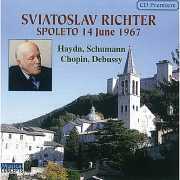The confusing and convoluted tale of my journey from composer to record label jack-of-all-trades to registered lobbyist (for the good guys in health and the performing arts) to renegade reissue producer is best left to a post all its own, but after having read and heard a litany of positive feedback on one reissue project with which I was recently involved, I feel the urge to weigh in.
Just over six years ago, Todd Landor — who was then heading the classical reissue program at SPJ Music, owner of the VOX/Turnabout recording catalog — asked me to create masters for a series of mass-market classical “hits” packages of the “25 Romantic Piano Masterpieces” variety (he wisely turned down my ideas of “25 Dodecaphonic Hits” and “25 Post-Stockhausen Favorites”). Not much later, he came to me with a bigger project: VOX’s landmark recordings of Bach’s complete (actually, about 2/3 of the then-surviving) organ works, some of which had not been digitally remastered. After tracking down masters in VOX’s tape room, I proceeded to transfer the tapes and effect 12 CD masters.
Todd went on to start his own labels, Musical Concepts and Alto, and I’ve been doing compilations and remastering for him ever since, including the A&R, compilation, and supplementary materials for Musical Concepts’ six-volume, 33-disc Alfred Deller Edition (using the late David Baker’s excellent tape-to-digital transfers).
 Last year, Todd managed to excavate most of the tapes for the two Turnabout LPs released in the late 1960s that were derived from a 1967 recital in Spoleto, Italy by Sviatoslav Richter. The LPs never sounded that great, but the performances shone through the surface noise. The tapes themselves (including some duplicate copies) were preserved in decent physical shape, though one of them had a huge string of dropouts in the first minute, and every single splice on what were clearly the originals had to be reworked. The overall sound left a bit to be desired, and in addition to a patina of tape hiss and distortion during the loudest passages there were many audio glitches on the master tapes — random short dropouts, non-acoustical clicks, and other remediable problem sections. There were a few intrusive coughs, and the Debussy Préludes Livre II featured the sound of church bells ringing and a particularly egregious door slam. It also turns out that a Melodiya studio recording of Prokofiev’s Sonata No. 7 — in glorious mono, unlike the rest of the recital — had been tacked on the first LP to fill out the program, with applause tackily spliced in afterward to persuade listeners that this was a live performance. The recording, nevertheless, is one of the better-sounding of Richter’s 1960s-vintage recitals — and Richter was for the most part at the top of his game.
Last year, Todd managed to excavate most of the tapes for the two Turnabout LPs released in the late 1960s that were derived from a 1967 recital in Spoleto, Italy by Sviatoslav Richter. The LPs never sounded that great, but the performances shone through the surface noise. The tapes themselves (including some duplicate copies) were preserved in decent physical shape, though one of them had a huge string of dropouts in the first minute, and every single splice on what were clearly the originals had to be reworked. The overall sound left a bit to be desired, and in addition to a patina of tape hiss and distortion during the loudest passages there were many audio glitches on the master tapes — random short dropouts, non-acoustical clicks, and other remediable problem sections. There were a few intrusive coughs, and the Debussy Préludes Livre II featured the sound of church bells ringing and a particularly egregious door slam. It also turns out that a Melodiya studio recording of Prokofiev’s Sonata No. 7 — in glorious mono, unlike the rest of the recital — had been tacked on the first LP to fill out the program, with applause tackily spliced in afterward to persuade listeners that this was a live performance. The recording, nevertheless, is one of the better-sounding of Richter’s 1960s-vintage recitals — and Richter was for the most part at the top of his game.
The biggest challenge with the tapes was removing the hiss (the level varied in some selections) while preserving the piano sound — especially in the quieter sections. The various clicks, thunks, and louder annoyances were more easily removed with the exception of the door slam, which involved a careful edit. I decided to do nothing about the church bells that open the Debussy — I remember hearing this recording as a college student, and even back then the effect of this serendipitously-timed “intrusion” was beautiful and atmospheric (I remember thinking that it was “John Cage in action”). Finally, the issue of the missing master had to be addressed, and the only solution was to transfer a mint-condition copy of the LP (which required a careful and thorough cleaning) and even more careful de-clicking, de-noising, and de-glitching to make it match the sound of the remainder of the program.
Todd reports that “Sviatoslav Richter — Spoleto 14 June 1967” is selling well, and the feedback at Amazon has been very encouraging. And, if you’ll excuse my temporary descent into marketing copy, it’s a bargain at well under ten bucks — and it makes a great gift. Below is a sample of Richter playing Schumann’s Novelette in F Major, Op.21 No.1
{enclose musicalconcepts.mc108.schumann.novellette1excerpt.mp3}
